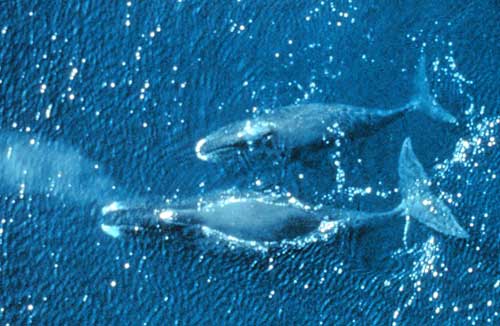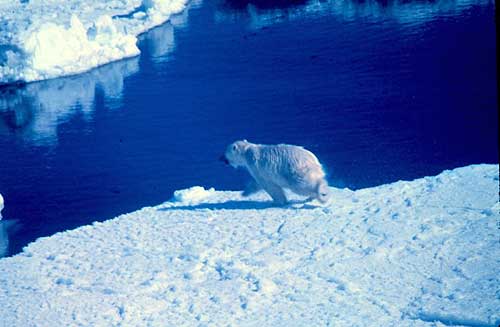 New Scientific Consensus:
Arctic Is Warming Rapidly
New Scientific Consensus:
Arctic Is Warming Rapidly
Much larger changes are projected,
affecting global climate
November 09, 2004
Tuesday
The Arctic is warming much more rapidly than previously known,
at nearly twice the rate of the rest of the globe, and increasing
greenhouse gases from human activities are projected to make
it warmer still, according to an unprecedented four-year scientific
study of the region conducted by an international team of 300
scientists released Monday.
At least half of the summer
sea ice in the Arctic is projected to melt by the end of this
century, along with a significant portion of the Greenland Ice
Sheet, as the region is projected to warm an additional 7 to
13°F (4-7°C) by 2100. These changes will have major global
impacts, such as contributing to global sea-level rise and intensifying
global warming, according to the final report of the Arctic Climate
Impact Assessment (ACIA).
 Bowhead whales - Balaena
mysticetus
Bowhead whales - Balaena
mysticetus
Photo courtesy NOAA
"Alaska is on the front lines of global warming," said
Melanie Duchin, Greenpeace Climate Campaigner in Anchorage, Alaska.
"The loss of polar sea ice means the loss of polar bears,
ringed seals, Pacific walrus and bowhead whales. These are distinctive
arctic species that are vitally important to the environment
and to Alaska Natives who depend on them for subsistence. Governments
must act to phase out fossil fuels in order to avert a meltdown
in the arctic."
The assessment was commissioned
by the Arctic Council (a ministerial intergovernmental forum
comprised of eight nations, including the United States, and
six Indigenous Peoples organizations) and the International Arctic
Science Committee (an international scientific organization appointed
by 18 national academies of science).
The assessment's findings and
projections were released Monday and will be presented in detail
at a scientific symposium in Reykjavik, Iceland, November 9-12,
2004.
The assessment's projections
are based on a moderate estimate of future emissions of carbon
dioxide and other greenhouse gases, and incorporate results from
five major global climate models used by the Intergovernmental
Panel on Climate Change.
"The impacts of global
warming are affecting people now in the Arctic," says Robert
Corell, chair of the ACIA. "The Arctic is experiencing some
of the most rapid and severe climate change on earth. The impacts
of climate change on the region and the globe are projected to
increase substantially in the years to come."
 Beaufort Sea, Alaska
- 1978 August
Beaufort Sea, Alaska
- 1978 August
Photographer: Captain Budd Christman, NOAA Corps - Courtesy NOAA
Highlighted Findings
- In Alaska, Western Canada,
and Eastern Russia average winter temperatures have increased
as much as 4 to 7°F (3-4°C) in the past 50 years, and
are projected to rise 7-13°F (4-7°C) over the next 100
years.
- Arctic sea ice during the
summer is projected to decline by at least 50 percent by the
end of this century with some models showing near-complete disappearance
of summer sea ice. This is very likely to have devastating consequences
for some arctic animal species such as ice-living seals and for
local people for whom these animals are a primary food source.
At the same time, reduced sea ice extent is likely to increase
marine access to some of the region's resources.
- Warming over Greenland will
lead to substantial melting of the Greenland Ice Sheet, contributing
to global sea-level rise at increasing rates. Over the long term,
Greenland contains enough melt water to eventually raise sea
level by
about 23 feet (about 7 meters).
- In the United States, low-lying
coastal states like Florida and Louisiana are particularly susceptible
to rising sea levels.
- Should the Arctic Ocean become
ice-free in summer, it is likely that polar bears and some seal
species would be driven toward extinction.
- Arctic climate changes present
serious challenges to the health and food security of some Indigenous
Peoples, challenging the survival of some cultures.
- Over the next 100 years, climate
change is expected to accelerate, contributing to major physical,
ecological, social, and economic changes, and the Assessment
has documented that many of these changes have already begun.
The Arctic Climate Impact Assessment
was formally initiated in 2000 at the Ministerial Meeting of
the Arctic Council at Point Barrow, Alaska as a joint project
between the Arctic Council and the International Arctic Science
Committee. As specified in the Barrow
Declaration, the goal of the ACIA is to "evaluate and synthesize
knowledge on climate variability and change and increased ultraviolet
radiation, and support policy-making processes and the work of
the Intergovernmental Panel on Climate Change." The Arctic
Council directed ACIA to address "environmental, human health,
social, cultural, and economic impacts and consequences, including
policy recommendations."
Sources:
Arctic Climate Impact Assessment
- University of Alaska Fairbanks
Web Site
Greenpeace - Anchorage
NOAA - Photographs
E-mail your news &
photos to editor@sitnews.org
Publish A Letter on SitNews Read Letters/Opinions
Submit
A Letter to the Editor
Sitnews
Stories In The News
Ketchikan, Alaska
|


